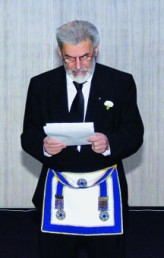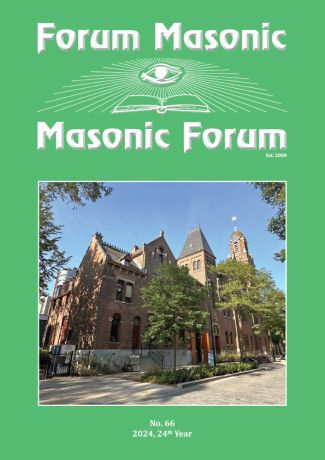NICOLAE ULIERIU
 In an older text, called Season of initiation, I said that, because of its three degrees, initiation is not only a climb from step to step – although the ascending sense of making something of oneself is firmly traced.
In an older text, called Season of initiation, I said that, because of its three degrees, initiation is not only a climb from step to step – although the ascending sense of making something of oneself is firmly traced.
To a perhaps more significant extent, more charged with meanings, initiation is the journey through three „dimensions”: internal, of course, but not without a connection to the space – we might call it geometric – which we temporarily inhabit.
Or, to put it in the terms of a mathematic which has not altogether fallen into the profane, initiation is a cubing – otherwise, “polishing the stone” would remain idle chatter and the symbol of the “polished stone” would lose its chief meaning.
Because I have been asked what I understand, in fact, by “cubing”, I will do over this exercise in imagination – speaking about what it represents as a category: “raising to a power”. Raising to a power – or „exponentializing”, after J. Bourget – means, speaking algebraically, the multiplication by itself of a number a, repeated n times; the formula is an (read: „a to the power of n”), where a, taken as a basis, receives n as an exponent (from the Latin exponens-tis = exposed, foregrounded).
How could we trans-scribe all this in a symbolic key? – knowing that the “trans-scribing” is not mere copying, but also presupposes bringing/transposing the text in a superior register of understanding and functioning: even if only by the often stated fact that “who writes reads twice”… Therefore, how?
If we remember the saying, older than the century, according to which «To know and to be are one», the answer is somewhat at hand: we cannot achieve the „exponentialization” of our own personalities, that is to say its evidencing (or, otherwise put, exposing it, in relation to a pre-formal or “incipient” stage), except by self-knowledge… And, as any exposing is or implies a proposing, the phrase „self-knowledge” designated, in fact, the “multiplication” – that is increasing oneself – of man through himself: done n times. That is to say: however many times he can.
About this he can, let us remember one of the aphorisms of Brâncuși – a veritable teaching for whoever wants to learn: «Things are not difficult to do, what is difficult is to place oneself in the state where you can do them»… As a high initiate, as he seems to have been, Brâncuși captures here the essence of becoming, of stepping on the Path – a becoming which presupposes, as I will show immediately, knowledge and overcoming.
This is, I think, what happens (more exactly: what should happen) also in the case of Freemason initiation: with every step climbed in the profundity of a degree, with each fertile dwelling in its interiority – to achieve, effectively, both the amplitude and the fullness of a more real understanding of its multiple conceptual dimensions –, the free mason (that is to say, the free builder of his own Self) should acquire a new knowledge of himself; he should “increase himself”: by, I was saying, “raising to a power”.
Whereas, initiation – in whatever doctrine it were to take place – is necessarily preceded by a “symbolic death” (what is to say, overcoming, vertically, the “darkness of the profane world”), it seems self-understood that raising to a power – taken in the sense described here – institutes the sign of equality between “self-knowledge” and “self-overcoming”: making them thus to go “hand in hand”, as two “soul mates”… Otherwise, everything would stagnate under the sign of a more noxious formalism, in time, than non-knowledge and / or non-overcoming. This said, my endeavor could come to a close; things, however, do not stop here… The problem of knowledge and overcoming is posed in a much more profound sense and, if I am allowed the expression, much more grave than it might appear from what was said before.
Let us take, first, the premise from which Mircea Eliade started in Nostalgia of the origins: «…the world decays by simple fact of its existence…». The idea, present – in ampler formulation – in René Guénon as well, offers the first set of motivations for initiation: only by ascending to the origins can we recuperate the fundamental truths, the foundational truths – lost or occulted by the continuous decay of the world.
And how can this recuperation be exercised more adequately / more fully, except by the attachment to an initiatic organization? Whereas the only organization that maintains a connection (fragile, but real) with the Great Tradition is, in today’s world, Regular Freemasonry… René Guénon is definite in this regard.
I will bring into the discussion now an aspect that depends on our own identity: how much of what defines me as an individual is owed to my will? Or at least to my free acceptance?… Nothing, one might answer; and rightly: name and surname, sex and year of birth, ethnicity and mother tongue, aptitudes, the color of one’s eyes and hair, prints (digital, vocal, ocular) – and the list could continua –, none of all these belongs to me by an act of will or pursuant to my free consent.
And nevertheless, these – precisely them – seem to contour or define my “identity”… But is it my true identity? Isn’t my true identity actually un-veiled to me, step by step and aspect after aspect, only after initiation? Only after I step on the Path? Only after I attempt – and, gradually, succeed – to identify myself with the Divine within me?
And can’t this identification perhaps be counted the supreme form of “raising” to a power?
I will raise one last question in this train of thought – of thoughts that have suggested to me and guide my endeavor: subject to all the conditioning I have recalled, does Man remain a mere creature?
Without naming it as such, Mircea Eliade suggests (also in the Nostalgia of the origins) the fact that to create may be a form of liberation from the conditioning of this world… Everything is said from this perspective, itself well “conditioned”, of the historian of religions – but the fact does not become for that reason less true; or less significant: «To know that man is always conditioned presupposes the understanding of the idea that he is at the same time a creative being. To the provocation addressed to him by cosmic conditioning, psychological or historical, he answers by creation».
Two brief conclusions, at the end of the road – an end which is, of course, only a (new) beginning:
* Man is not merely a creature; by raising to power, he becomes himself a creator: the creator of his own self and / or a creator of art.
* Creation is itself a form of initiation, of knowledge and overcoming and it is not happenstance, the fact that (to different, but certain extents) the great creators were also great initiates.

















